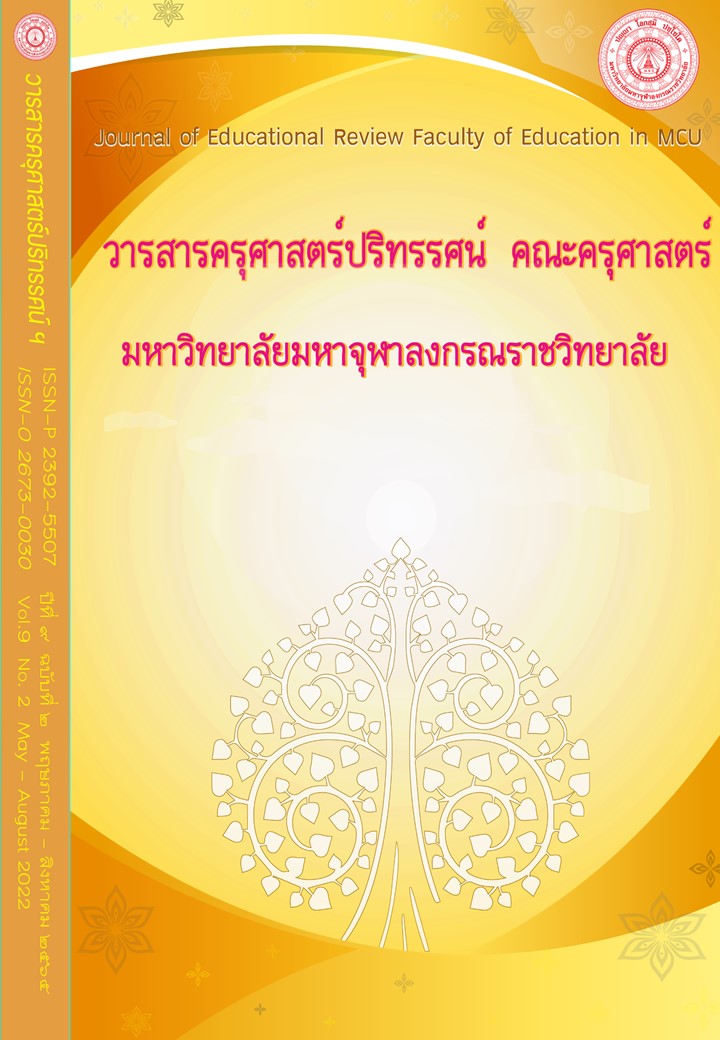THE PRIORITY NEEDS OF SCHOOLS UNDER BANGKOK SECONDARY EDUCATIONAL SERVICE ARES 1 BASED ON THE CONCEPT OF INNOVATION ECOSYSTEMS
Main Article Content
Abstract
The objectives of this research paper were 1) study the desirable current condition and circumstance of the secondary school administration under the Secondary Educational Service Area Office Bangkok 1 based on the Innovation Ecosystems concept 2) study the priority needs of secondary school administration under the Secondary Educational Service Area Office Bangkok 1 based on the Innovative Ecosystems concept, using descriptive analysis. The research population consists of the administrators, teachers, and educational personnel under the Secondary Educational Service Area Office Bangkok 1 Group 2 from 14 schools 285 persons in total. The analysis tool is a questionnaire. The analytic statistics consist of the average, frequency, percentage, arithmetic mean, standard deviation parameters, and modified priority needs indem (PNImodified) The research result reveals that 1) the current condition of the administration of secondary schools under the Secondary Educational Service Area Office Bangkok 1 based on the Innovation Ecosystems concept is at a medium level The desired condition of the administration of secondary schools under the Secondary Educational Service Area Office Bangkok 1 based on the Innovation Ecosystems concept is at the highest level 2) The need of the administration of secondary schools under the Secondary Educational Service Area Office Bangkok 1 based on the Innovation Ecosystems concept overall is at 0.324 (PNImodified = 0.324) in 3 aspects sorted by highest-lowest 1) the planning having the highest need (PNImodified = 0.327) followed by 3) the assessment (PNImodified = 0.324) and 2) the implementation (PNImodified = 0.321).
Article Details

This work is licensed under a Creative Commons Attribution-NonCommercial-NoDerivatives 4.0 International License.
ทัศนะและความคิดเห็นที่ปรากฏในบทความในวารสารฉบับนี้ถือเป็นความรับผิดชอบของผู้เขียนบทความนั้นเพียงผู้เดียว และไม่ถือเป็นทัศนะและความรับผิดชอบของกองบรรณาธิการ
กองบรรณาธิการขอสงวนสิทธิ์ในการคัดเลือกบทความลงตีพิมพ์และจะแจ้งให้เจ้าของบทความทราบหลังจากผู้ประเมินบทความตรวจอ่านบทความแล้ว
ต้นฉบับที่ได้รับการตีพิมพ์ในวารสารครุศาสตร์ปริทรรศน์ คณะครุศาสตร์ มหาวิทยาลัยมหาจุฬาลงกรณราชวิทยาลัย ถือเป็นกรรมสิทธิ์ของคณะครุศาสตร์ มหาวิทยาลัยมหาจุฬาลงกรณราชวิทยาลัย ห้ามนำข้อความทั้งหมดหรือบางส่วนไปพิมพ์ซ้ำ เว้นเสียแต่ว่าจะได้รับอนุญาตจากมหาวิทยาลัยฯ เป็นลายลักษณ์อักษร
References
ยุทธนา พรหมมณี. (2563). การนำแผนสู่การปฏิบัติ. แหล่งที่มา www.pncc.ac.th/pncc/word/plan.doc. สืบค้นเมื่อ 9 ก.ย. 2563.
สมคิด พรมจุ้ย. (2550). เทคนิคการประเมินโครงการ. กรุงเทพมหานคร: จตุพรดีไซน์.
สำนักงานเขตพื้นที่การศึกษามัธยมศึกษากรุงเทพมหานคร เขต 1. (2563). ข้อมูลสารสนเทศสำนักงานเขตพื้นที่การศึกษามัธยมศึกษากรุงเทพมหานคร เขต 1. แหล่งที่มา https://eservice.sesao1.go.th/info/maps/student. สืบค้นเมื่อ 10 พ.ย. 2563.
สำนักงานคณะกรรมการนโยบายวิทยาศาสตร์ เทคโนโลยี และนวัตกรรมแห่งชาติ. (2561). รายงานประจำปี 2561 สำนักงานคณะกรรมการนโยบายวิทยาศาสตร์ เทคโนโลยี และนวัตกรรมแห่งชาติ. กรุงเทพมหานคร: สำนักงานคณะกรรมการนโยบายวิทยาศาสตร์ เทคโนโลยี และนวัตกรรมแห่งชาติ.
สำนักงานคณะกรรมการพัฒนาเศรษฐกิจและสังคมแห่งชาติ. (2560). แผนพัฒนาเศรษฐกิจและสังคมแห่งชาติ ฉบับที่ 12 (พ.ศ.2560 - 2564). กรุงเทพมหานคร: สำนักงานคณะกรรมการพัฒนาเศรษฐกิจและสังคมแห่งชาติ.
สำนักงานนวัตกรรมแห่งชาติ. (2563). ระบบนิเวศนวัตกรรม. แหล่งที่มา https://mis.nia.or.th/nia. สืบค้นเมื่อ 10 พ.ย. 2563.
สุกัญญา แช่มช้อย. (2562). การบริหารสถานศึกษาในยุคดิจิทัล. กรุงเทพมหานคร: สำนักพิมพ์จุฬาลงกรณ์มหาวิทยาลัย.
สุนีย์ บันโนะ และวลัยพร ศิริภิรมย์. (2561). แนวทางการพัฒนาการบริหารโรงเรียนในการเสริมสร้างจิตสำนึกความเป็นพลเมืองโลกของนักเรียนตามแนวคิดการพัฒนาทั้งโรงเรียน. วารสารการบริหารและนวัตกรรมการศึกษา. 1(1). 1-22.
เอกชัย กี่สุขพันธ์. (2554). การบริหารทักษะและการปฏิบัติ. พิมพ์ครั้งที่ 4. กรุงเทพมหานคร: สำนักพิมพ์สุขภาพใจ.
Adner Kapoor. (2010). Value creation in innovation ecosystems: how the structure of technological interdependence affects firm performance in new technology generation. Strategic Management Journal. 31(3).
Durst and Poutanen. (2013). Success factors of innovation ecosystems. From https://researchportal.helsinki.fi/en/publications/success-factors-of-innovation-ecosystems-a-literature-review. Retrieved February 12, 2020.
Newby, T. J., Stepich, D. A., James. D., Rusell, J. D. (2000). Instruction technology for teaching learning. From http://www.forbes.com/sites/jacobmorgan/ 2015/08/12/innovation-ecosystem-future-of-work/. Retrieved February 12, 2020.
Taro Yamane. (1973). Statistics: An Introductory Analysis. 3rd ed. New York: Harper and Row Publications.


